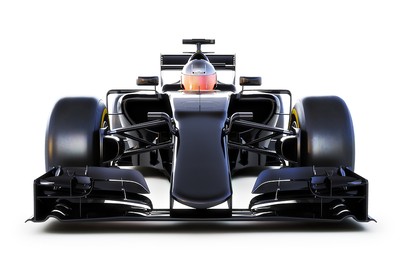
In Formula One races, even the likes of changing tyres can make the difference between winning and losing a race. It is why the pit stop teams practice relentless to get their times down as low as possible and give the drivers the best possible chance of being victorious in their races. It can be crucial to victory, which is why it is an important thing to think about if you’re considering placing any bets on the F1. Whether it be individual races or the likes of the winners of the Constructors’ Championship, knowing which team is best at pit stops is an important piece of information to have at your disposal.
There is an extent to which the mechanics working in the pits and carrying out the pit stops are the unsung heroes of the F1 world. They work hard throughout the season to get the drivers back on the track as soon as possible, but rarely get the credit that they deserve for that work. That is why, perhaps, the Formula One sponsor DHL decided to introduce the Fastest Pit Stop award back in 2015, giving credit where it was due to those people getting the cars on the track quick-style. The question is, what are the fastest pit stops in the history of the sport?
Quick Answer: Who Has Had the Fastest F1 Pit Stop?
Between the 2018 and 2022 Formula One seasons, the fastest pit stop was recorded by Red Bull and Max Verstappen at the Brazilian Grand Prix which took just 1.82 seconds to complete.
DHL’s Fastest Pit Stop Award
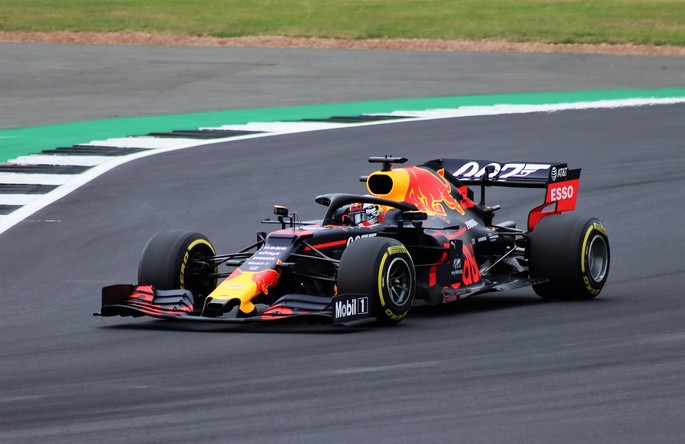
Red Bull won five consecutive Fastest Pit Stop Awards between 2018 and 2022
In 2015, the F1 sponsor DHL decided to introduced an award that was aimed to ‘recognise outstanding teamwork and performance from the ‘unsung heroes’ who make a critically important contribution to the drivers’ success on the track’. The idea was that it would give an award to the team ‘that demonstrates the ability to work with speed and efficiency most consistently’. It has been awarded every year since its introduction and in 2017 a points format was introduced in order to determine the recipient of the award courtesy of their consistency.
The constructor that manages to record the fastest pit stop of a Grand Prix gets 25 points, with the second-quickest getting 18 points and the third most speedy receiving 15 points. At the end of the season, all of those points are added together in order to see one team receive the trophy for being the most consistent when it comes to pit stops. You’ll notice that it isn’t an award for the fastest pit stop in a season, which is an entirely different thing and not what DHL have decided to reward with their award.
Here is a look at the winners of the DHL Fastest Pit Stop award since it was first introduced:
DHL Fastest Pit Stop Award Winners – 2015 to 2022
| Year | Winner | Points | Drivers’ Champion | Constructors’ Champion |
|---|---|---|---|---|
| 2022 | Red Bull Racing | 536 | ✅ | ✅ |
| 2021 | Red Bull Racing | 569 | ✅ | ✖ |
| 2020 | Red Bull Racing | 555 | ✖ | ✖ |
| 2019 | Red Bull Racing | 504 | ✖ | ✖ |
| 2018 | Red Bull Racing | 466 | ✖ | ✖ |
| 2017 | Mercedes | 472 | ✅ | ✅ |
| 2016 | Williams | N/A | ✖ | ✖ |
| 2015 | Ferrari | N/A | ✖ | ✖ |
By the end of the 2022 season, it was clear that Red Bull were the dominant force in the Fastest Pit Stop award. Interestingly, the award doesn’t necessarily always match the winner of either the Drivers’ Championship nor the Constructors’ Championship, as you can see. As far as the Constructors’ Championship is concerned, the winner of the Fastest Pit Stop and the best constructor has only been aligned twice. As for the Drivers’ Championship, that and the Fastest Pit Stop have been in line with each on three occasions.
Quickest Pit Stops of the Season
Since 2018, DHL have collected data on the fastest pit stops to take place during the course of the season. Here is a look at the fastest times for each of the seasons the data is available:
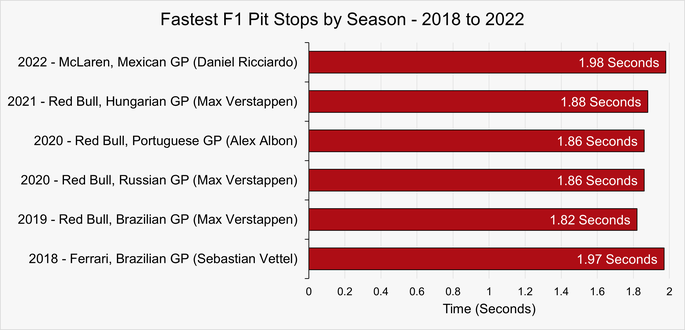
The interest thing to note from the table is that the times haven’t necessarily been getting quicker. In fact, the quickest speed in 2022 was equal with the fourth fastest time the year before. Since Max Verstappen’s team managed his 1.82 second change in 2018, the fastest time has got longer, albeit only by fractions of a second.
The Evolution Of The F1 Pit Stop
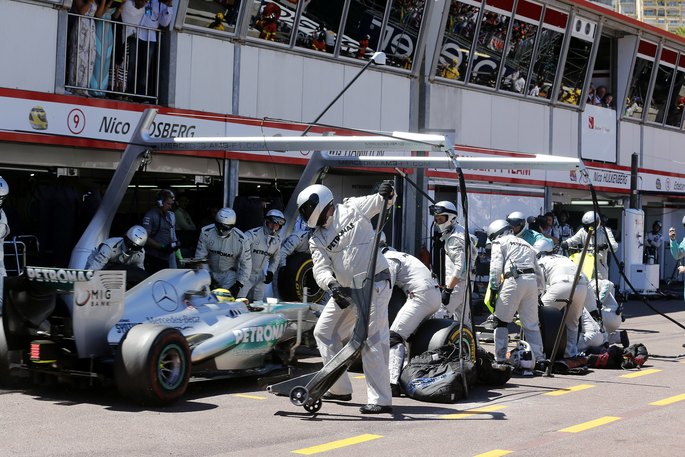
By United Autosports, flickr
It is fair to say that the drivers of yesteryear would stare agog at the manner in which pit stops take place nowadays. That is because of the manner in which pit stops have evolved over the years, matching the words of Wyatt Earp, who once said, “You need to take your time in a hurry.” With more than 20 people involved in pit stops, it is fair to say that all concerned, including the driver, need to make sure that they are precise in their movements if they wish to get the work done as well, and as quickly, as possible. That is hugely different from how things used to be.
When the first Formula One races took place, they were road races in which the mechanic would ride in the car with the driver and make repairs as and when they were needed. When the races moved into closed-circuits, how pit stops worked changed accordingly. In 1935, the first Grand Prix was held at Donington Park and the Germans had been working hard on their pit stops in order to demonstrate their superiority. When Manfred von Brauchitsch entered the pit lane, his fuel tank was refilled, tyres changes, new goggles handed over and a bottle of water given to him in a time of 33 seconds.
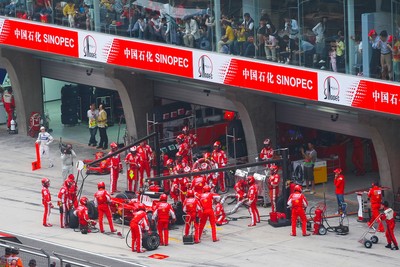
Ferrari Refuelling at the Chinese F1 Grand Prix by Tim Wang, flickr
As technology evolved, pit stops became faster. One of the biggest changes came about in 1984, which was when in-race refuelling was banned and the timing of pit stops improved accordingly. The Belgian Grand Prix of 1993 was the scene of the fastest pit stop of the time, when Benetton managed to get fresh tyres on and service the car in 3.2 seconds. It says something of the improvements that have taken place since that that would be considered a slow pit stop by modern standards. Between 1994 and 2009, however, re-fuelling was re-introduced to F1.
That meant that the speed of the pit stops was limited by how quickly fuel could be entered into the car. Tyres were being changed quickly, but there is only so fast that you can get liquid from one location to another. Refuelling mid-race was banned again in 2010, with the race to nail down the fastest pit stop in place ever since. By 2012, most teams were breaking a three-second pit stop on a regular basis, whilst innovations continued to ensure that the time kept dropping. The invention of the pivoting jack, for example, allows the front jack man to be out of the way of the car before it is lowered.
In 2013, Red Bull Racing became the first time to achieve a sub-two second pit stop, which occurred at the United States Grand Prix in Austin, Texas. Nowadays, that is to be expected of most teams if they want to win. Whilst it isn’t a definitive factor, managing to get the pit stop time down as low as possible is a neat but of fine margin achievement that teams can aim for. In a sport where the finest margins can be the difference in huge amounts of money depending on where a team finishes in the Constructors’ Championship, it is little wonder that some teams focus on getting the changes done as quickly as possible.
Full List of Fastest Pit Stops Each Season
Below is a full list of the ten fastest pit stops in Formula One between the 2018 and 2022 seasons.
Top 10 Fastest Pit Stops Per Season – 2018 to 2022
| Season | Rank | Time (secs) | Constructor | Driver | Grand Prix |
|---|---|---|---|---|---|
| 2022 | 1 | 1.98 | McLaren | Daniel Ricciardo | Mexican GP (30th Oct) |
| 2022 | 2 | 2.04 | Red Bull | Sergio Perez | Brazilian GP (13th Nov) |
| 2022 | 3 | 2.09 | Red Bull | Sergio Perez | Dutch GP (4th Sept) |
| 2022 | =4 | 2.10 | Red Bull | Sergio Perez | Italian GP (11th Sept) |
| 2022 | =4 | 2.10 | AlphaTauri | Yuki Tsunoda | Brazilian GP (13th Nov) |
| 2022 | =6 | 2.13 | AlphaTauri | Yuki Tsunoda | Brazilian GP (13th Nov) |
| 2022 | =6 | 2.13 | Red Bull | Sergio Perez | United States GP (23rd Oct) |
| 2022 | 8 | 2.14 | AlphaTauri | Yuki Tsunoda | United States GP (23rd Oct) |
| 2022 | =9 | 2.17 | AlphaTauri | Pierre Gasly | Brazilian GP (13th Nov) |
| 2022 | =9 | 2.17 | Red Bull | Sergio Perez | Italian GP (11th Sept) |
| 2021 | 1 | 1.88 | Red Bull | Max Verstappen | Hungarian GP (1st Aug) |
| 2021 | 2 | 1.93 | Red Bull | Max Verstappen | Bahrain GP (28th Mar) |
| 2021 | 3 | 1.96 | Red Bull | Max Verstappen | Hungarian GP (1st Aug) |
| 2021 | =4 | 1.98 | Red Bull | Max Verstappen | Portuguese GP (2nd May) |
| 2021 | =4 | 1.98 | Red Bull | Max Verstappen | Azerbaijan GP (6th June) |
| 2021 | 6 | 2.00 | Red Bull | Sergio Perez | Bahrain GP (28th Mar) |
| 2021 | 7 | 2.02 | Red Bull | Max Verstappen | Monaco GP (23rd May) |
| 2021 | 8 | 2.04 | Red Bull | Sergio Perez | French GP (20th June) |
| 2021 | 9 | 2.08 | Aston Martin | Lance Stroll | Portuguese GP (2nd May) |
| 2021 | 10 | 2.09 | Red Bull | Max Verstappen | Styrian GP (27th June) |
| 2020 | =1 | 1.86 | Red Bull | Alex Albon | Portuguese GP (25th Oct) |
| 2020 | =1 | 1.86 | Red Bull | Max Verstappen | Russian GP (27th Sept) |
| 2020 | 3 | 1.89 | Red Bull | Alex Albon | Russian GP (27th Sept) |
| 2020 | =4 | 1.90 | Red Bull | Max Verstappen | Spanish GP (16th Aug) |
| 2020 | =4 | 1.90 | Red Bull | Alex Albon | Sakhir GP (6th Dec) |
| 2020 | 6 | 1.92 | Red Bull | Max Verstappen | Eifel GP (11th Oct) |
| 2020 | 7 | 1.93 | Red Bull | Alex Albon | Emilia Romagna GP (1st Nov) |
| 2020 | 8 | 1.95 | Red Bull | Max Verstappen | Styrian GP (12th July) |
| 2020 | 9 | 1.96 | Red Bull | Max Verstappen | Portuguese GP (25th Oct) |
| 2020 | 10 | 2.00 | Williams | George Russell | Russian GP (27th Sept) |
| 2019 | 1 | 1.82 | Red Bull | Max Verstappen | Brazilian GP (17th Nov) |
| 2019 | 2 | 1.88 | Red Bull | Max Verstappen | German GP (28th July) |
| 2019 | 3 | 1.91 | Red Bull | Pierre Gasly | British GP (14th July) |
| 2019 | 4 | 1.93 | Red Bull | Alex Albon | Mexican GP (27th Oct) |
| 2019 | 5 | 1.96 | Red Bull | Max Verstappen | British GP (14th July) |
| 2019 | 6 | 1.97 | Williams | Robert Kubica | French GP (23rd June) |
| 2019 | 7 | 1.99 | Williams | Robert Kubica | German GP (28th July) |
| 2019 | 8 | 2.00 | Williams | Robert Kubica | Canadian GP (9th June) |
| 2019 | =9 | 2.02 | Williams | Robert Kubica | Austrian GP (30th June) |
| 2019 | =9 | 2.02 | Red Bull | Alex Albon | United States GP (3rd Nov) |
| 2018 | 1 | 1.97 | Ferrari | Sebastian Vettel | Brazilian GP (11th Nov) |
| 2018 | 2 | 2.08 | Red Bull | Max Verstappen | Abu Dhabi GP (25th Nov) |
| 2018 | 3 | 2.09 | Ferrari | Sebastian Vettel | German GP (22nd July) |
| 2018 | 4 | 2.10 | Williams | Sergey Sirotkin | Hungarian GP (29th July) |
| 2018 | =5 | 2.15 | Red Bull | Max Verstappen | Australian GP (25th Mar) |
| 2018 | =5 | 2.15 | Mercedes | Valtteri Bottas | Chinese GP (15th Apr) |
| 2018 | =5 | 2.15 | Ferrari | Sebastian Vettel | Mexican GP (28th Oct) |
| 2018 | =8 | 2.18 | Red Bull | Daniel Ricciardo | Austrian GP (1st July) |
| 2018 | =8 | 2.18 | Williams | Lance Stroll | Azerbaijan GP (29th Apr) |
| 2018 | 10 | 2.20 | Ferrari | Kimi Räikkönen | Mexican GP (28th Oct) |
